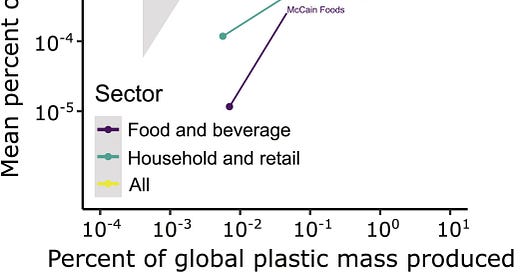Production caps on plastics are overdue to be successful in the battle against pollution
And the need to discuss plastic pollution in the context of a Just Transition is necessary
A recent study revealed that a mere 56 multinational corporations bear responsibility for over half of the world's plastic pollution, indicating a concerning concentration of environmental impact. The top 5 companies were responsible for 24% of the branded plastic; 56 companies were responsible for greater than 50% of the branded plastic. Coca-Cola, Pepsi, Nestle, Danone, and Unilever were the top 5 offenders in the branded plastic pollution category (see below).
Source: Science.org
This revelation comes amid a stark reality: global plastic production has doubled since 2000 and is projected to triple by 2050, exacerbating the plastic crisis.
Key findings from the study shed light on the urgency of the situation:
Every 1% increase in plastic production directly correlates with a 1% rise in branded plastic pollution, underscoring the critical need to curb production and transition to a circular economy.
Despite the very many ambitious ESG goals set aside by large companies, they are not doing any better or worse than smaller companies at preventing the plastic they produce from entering the environment.
A staggering 80% of marine debris consists of plastic, primarily originating from single-use packaging for food, beverages, and tobacco, posing severe threats to marine life and ecosystems.
Only half of the littered plastic can be traced back to its producing companies, highlighting a glaring lack of transparency and accountability in the plastics industry.
How do we fix this issue?
Addressing plastic pollution necessitates a multifaceted approach that balances personal and corporate responsibility while investing in a circular economy infrastructure:
Implement strict regulations and caps on plastic production to allow the room to recycle and promote alternative materials.
Embrace Extended Producer Responsibility (EPR), like in the case of batteries for electric vehicles, holding companies financially accountable for their products' entire lifecycle to incentivize eco-friendly packaging and reduce environmental harm.
Advocate for and require greater transparency in public ESG disclosures from these big plastic producers and polluters about what they do with plastic waste, how they monitor and track it, and their efforts to enable a circular economy.
Bring plastic pollution in to the narrative on a Just Transition. An overwhelming portion of the discussion today is focused on the impact of emissions on low and moderate income communities (LMI); extending this to include impact of plastics will drive concerted efforts at grassroots levels.
Invest in recycling infrastructure, funded in part by producers as well as government, to enhance waste management and recycling capabilities globally.
Prioritizing education and awareness initiatives to educate consumers about plastic pollution's impact and encourage sustainable practices, from reducing single-use plastics to supporting environmentally conscious businesses.
From a timing standpoint, it is important to note that the fourth session of the Intergovernmental Negotiating Committee on Plastic Pollution recently concluded in Ottawa, Canada. In a first, nations began negotiating over the specifics of what is expected to become a global treaty. Some of the key takeaways and considerations for the treaty are the following:
Limit how much plastic is produced in the world.
Plastic waste exposes those involved in sorting, recycling, and selling plastics to hazardous chemicals. Representation from the waste pickers are pushing for a treaty that recognizes the role they play and want a transition to safe jobs.
Oceans and plastic pollution in oceans is not part of the scope for the treaty.
What are your thoughts on additional considerations to limit plastic pollution?



